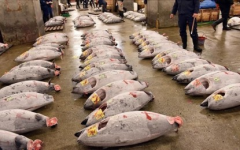- Thread Author
- #1
- Joined
- Sep 25, 2023
- Messages
- 36,783
- Reaction score
- 3,016
- Trophy Points
- 180
- Location
- Philippines
- D Bucks
- 💵5.264150
- Referral Credit
- 100
According to the report, China will suspend seafood imports from Japan amid diplomatic tensions triggered by the Japanese prime minister’s remarks on Taiwan, which sparked a backlash in Beijing.
The report stated that this happened after the Japanese Farm Minister Norikazu Suzuki said that Japan has resumed seafood exports to China for the first time since Beijing imposed a blanket ban in 2023 over the release of treated radioactive wastewater from the Fukushima Daiichi nuclear plant.
The report also said that China announced in June that it would partially lift the ban after Japan pledged to guarantee the safety and quality of seafood exports. Restrictions, however, remain on seafood from 10 of Japan’s 47 prefectures, including Fukushima.
However, the diplomatic tension between the two countries escalated after Premier Sanae Takaichi said on November 7 that any Chinese military action against Taiwan, including a naval blockade, could qualify as a "survival-threatening situation," enabling Japan to exercise its right to collective self-defense.
This statement slammed Beijing, and thus, the conflict escalated and prompted China to sanction its citizens to avoid visiting Japan.
Additionally, in Beijing on Tuesday, Japanese diplomat Masaaki rejected the basis of China's travel alert, saying that Japan’s public safety situation “is not deteriorating.”
Meanwhile, Beijing said Chinese Premier Li Qiang does not plan to meet with Japanese counterpart Takaichi in South Africa, on the sidelines of the Group of 20 leaders' summit this weekend.
Source: PNA/ ANADOLU

The report stated that this happened after the Japanese Farm Minister Norikazu Suzuki said that Japan has resumed seafood exports to China for the first time since Beijing imposed a blanket ban in 2023 over the release of treated radioactive wastewater from the Fukushima Daiichi nuclear plant.
The report also said that China announced in June that it would partially lift the ban after Japan pledged to guarantee the safety and quality of seafood exports. Restrictions, however, remain on seafood from 10 of Japan’s 47 prefectures, including Fukushima.
However, the diplomatic tension between the two countries escalated after Premier Sanae Takaichi said on November 7 that any Chinese military action against Taiwan, including a naval blockade, could qualify as a "survival-threatening situation," enabling Japan to exercise its right to collective self-defense.
This statement slammed Beijing, and thus, the conflict escalated and prompted China to sanction its citizens to avoid visiting Japan.
Additionally, in Beijing on Tuesday, Japanese diplomat Masaaki rejected the basis of China's travel alert, saying that Japan’s public safety situation “is not deteriorating.”
Meanwhile, Beijing said Chinese Premier Li Qiang does not plan to meet with Japanese counterpart Takaichi in South Africa, on the sidelines of the Group of 20 leaders' summit this weekend.
Source: PNA/ ANADOLU




